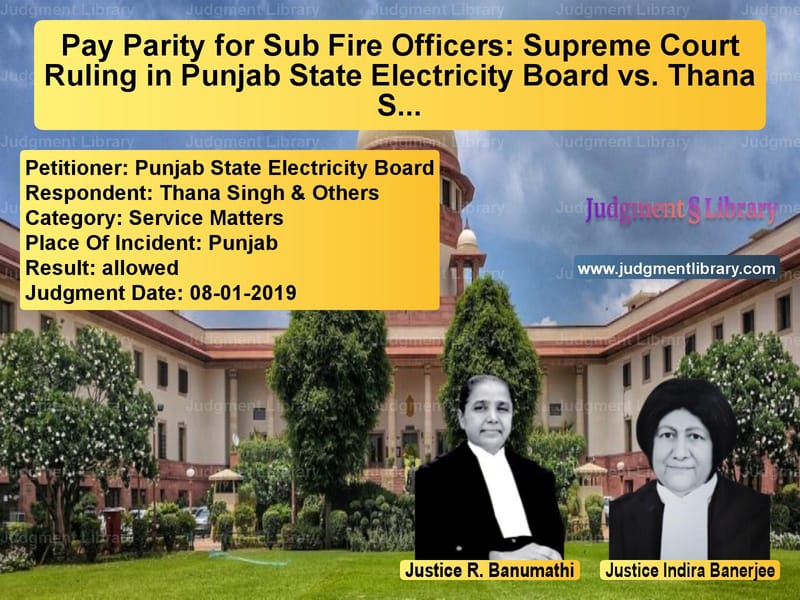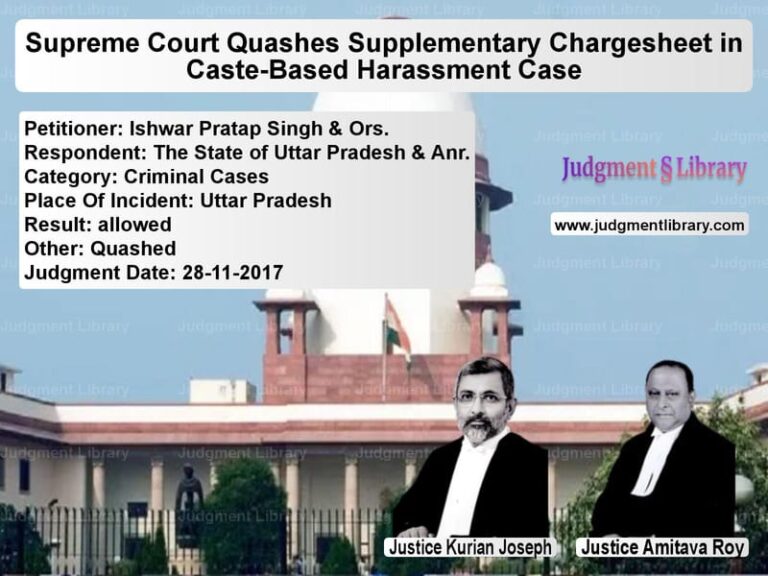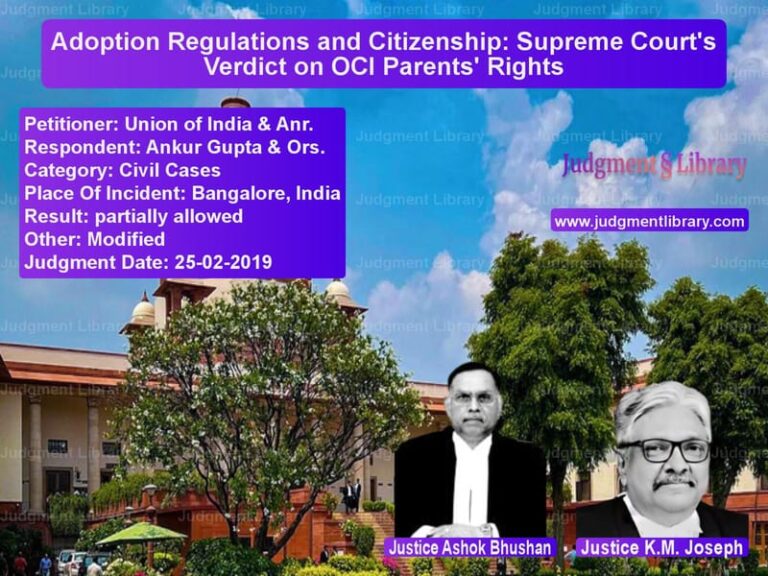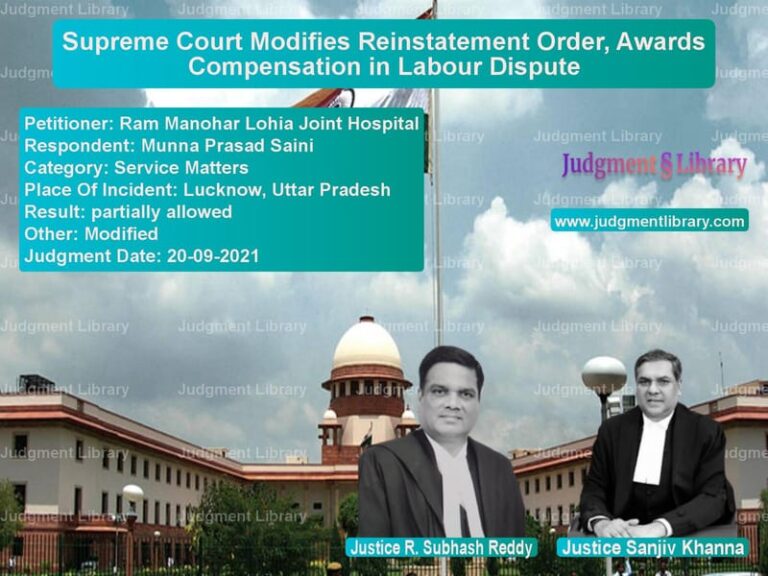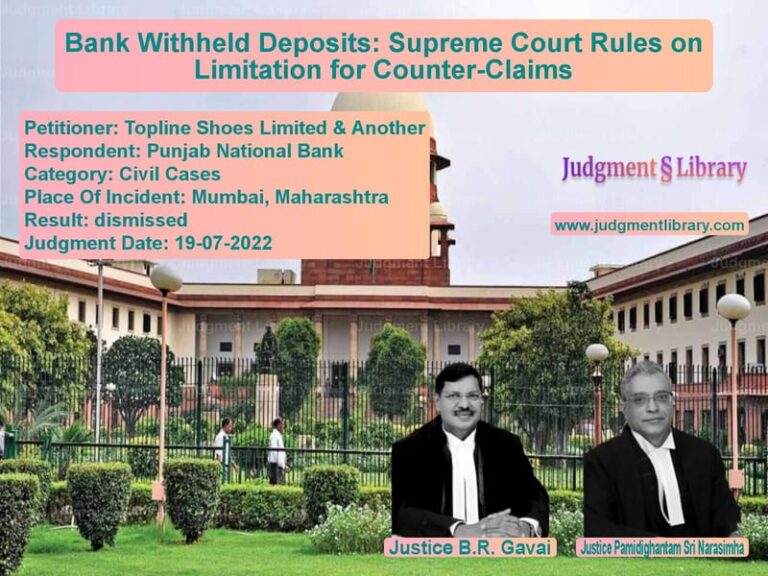Pay Parity for Sub Fire Officers: Supreme Court Ruling in Punjab State Electricity Board vs. Thana Singh
The case of Punjab State Electricity Board (PSEB) vs. Thana Singh & Others addresses a significant dispute regarding pay parity for Sub Fire Officers working under the PSEB. The respondents, working as Sub Fire Officers, claimed that they were entitled to the same pay scales as other employees in Group XII of the PSEB, such as Head Clerks, Head Clerk-cum-Divisional Accountants, and Internal Auditors. The Supreme Court’s decision highlights the intricate aspects of pay scale determination and the constitutional principle of equality before the law.
The case is important not only for addressing the rights of Sub Fire Officers but also for establishing the parameters within which claims for equal pay for equal work can be considered under Article 14 (right to equality) of the Indian Constitution.
Background of the Case
The respondents, Sub Fire Officers, were inducted into the PSEB in 1978. The pay scale for their position was initially revised in 1978 and again in 1986. However, despite these revisions, the Sub Fire Officers were excluded from further revisions that were granted to other employees in Group XII. This discrepancy led to the filing of the suit by the respondents, claiming that their pay scale should be revised to match that of other employees in the same group.
The appellant, PSEB, contended that the Sub Fire Officers’ duties and responsibilities were distinct from those of the other employees in Group XII, and hence, they should not be entitled to the same pay scale.
Legal History and Proceedings
The respondents initially filed a writ petition (CWP No. 9294/1993) in 1993, arguing that the denial of parity in pay scales violated Article 14 of the Constitution, which guarantees equality before the law. The issue centered on whether employees in different posts within Group XII, despite having similar classifications, could claim equal pay for equal work.
The trial court dismissed the suit in 1981 on the grounds that the respondents had failed to prove possession over the disputed land. Both the first appeal and the second appeal were subsequently dismissed by the District Judge and the High Court, respectively. However, the respondents continued their legal battle, appealing for a fair hearing and rectification of what they perceived as inequality in pay treatment.
Arguments by the Appellant (PSEB)
The appellant, PSEB, presented several arguments to counter the claims of the respondents:
- PSEB is an autonomous body and is not bound by the pay structure of the Punjab Government, which was the basis for the respondents’ claims.
- The posts of Sub Fire Officers and Head Clerks/Internal Auditors have different job responsibilities, recruitment qualifications, and duties. Thus, they cannot be equated for pay parity purposes.
- The Sub Fire Officers belong to a distinct cadre with different roles and qualifications compared to the other posts in Group XII. Therefore, the appellant argued that parity in pay scales is not applicable.
- The financial impact of implementing pay parity would be significant, considering the total number of employees and the broader financial health of the PSEB.
Arguments by the Respondents
The respondents contended that:
- The posts of Sub Fire Officers should be treated equally to other posts within Group XII because they belong to the same pay scale category.
- The pay scales of other Group XII employees had been revised, but the Sub Fire Officers were excluded without any justifiable reason.
- The exclusion was discriminatory and violated their constitutional right to equality.
- Since the responsibilities of Sub Fire Officers were similar to those of other employees in Group XII, they were entitled to the same pay scale.
Supreme Court’s Observations and Judgment
The Supreme Court reviewed the arguments and the facts of the case. The Court examined Section 14 of the Constitution and the doctrine of “equal pay for equal work”. The Court emphasized the importance of considering the nature of work, duties, responsibilities, qualifications, and recruitment standards while determining pay parity.
It was observed:
“Equality in pay can only be claimed when there is complete identity in duties, responsibilities, qualifications, and other essential criteria between the two posts.”
The Court referred to previous judgments such as Steel Authority of India Limited v. Dibyendu Bhattacharya (2011) 11 SCC 122, where it was held that the determination of pay parity must be left to expert bodies such as the government or regulatory agencies. The Court also noted that simply categorizing different posts within the same pay group does not automatically entitle employees in those posts to equal pay.
The ‘Rarest of Rare’ Doctrine
To determine whether the death penalty was warranted, the Court examined the principles laid down in Bachan Singh vs. State of Punjab, which emphasize that capital punishment should be reserved for only the most exceptional cases.
The Court stated:
“There are numerous other circumstances justifying the passing of the lighter sentence; as there are countervailing circumstances of aggravation.”
In Machhi Singh vs. State of Punjab, the Supreme Court provided a framework for deciding when a case qualifies as the ‘rarest of rare.’ The Court applied these guidelines and noted:
- The act was undoubtedly heinous but lacked prolonged torture or extreme depravity.
- The appellant’s previous criminal record, while serious, did not establish a pattern of indiscriminate violence.
- The choice of acid as a weapon suggested an intent to cause grievous harm, rather than certain death.
Final Judgment
The Court ruled that the respondents were not entitled to parity in pay scales with the Head Clerks, Internal Auditors, and similar posts within Group XII. The Court stated:
“The mere fact that the Sub Fire Officers are placed in the same pay scale group as other employees does not entitle them to the same pay. The nature of their duties and qualifications are distinct, and the principle of ‘equal pay for equal work’ does not apply in this case.”
The judgment also acknowledged that pay decisions should be made by expert committees, and the Court should refrain from interfering in such decisions unless there is clear evidence of unjustified discrimination.
Conclusion
The ruling in this case clarified the scope of the “equal pay for equal work” doctrine under Article 14 of the Constitution. It reaffirmed that pay scale determinations should be based on an evaluation of duties, responsibilities, and qualifications, and not solely on the categorization of posts within the same group. The Court’s decision not only addressed the issue of pay parity for Sub Fire Officers but also set important precedents regarding the role of expert committees in pay scale decisions and the application of constitutional principles of equality.
Petitioner Name: Punjab State Electricity Board.Respondent Name: Thana Singh & Others.Judgment By: Justice R. Banumathi, Justice Indira Banerjee.Place Of Incident: Punjab.Judgment Date: 08-01-2019.
Don’t miss out on the full details! Download the complete judgment in PDF format below and gain valuable insights instantly!
Download Judgment: Punjab State Electri vs Thana Singh & Others Supreme Court of India Judgment Dated 08-01-2019.pdf
Direct Downlaod Judgment: Direct downlaod this Judgment
See all petitions in Employment Disputes
See all petitions in Public Sector Employees
See all petitions in Judgment by R. Banumathi
See all petitions in Judgment by Indira Banerjee
See all petitions in allowed
See all petitions in supreme court of India judgments January 2019
See all petitions in 2019 judgments
See all posts in Service Matters Category
See all allowed petitions in Service Matters Category
See all Dismissed petitions in Service Matters Category
See all partially allowed petitions in Service Matters Category

